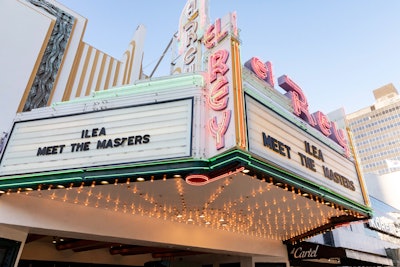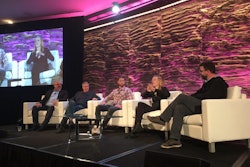
LOS ANGELES— Money is always a sensitive topic—but it’s one that event professionals can’t afford to ignore.
How can an event firm educate clients on the costs associated with their services, and learn how to walk away when needed? How can a client differentiate between a more experienced firm and one that just looks good on social media? How can producers and vendors keep their integrity through such a complicated process?
These questions and more were discussed at the latest edition of ILEA Los Angeles’s “Meet the Masters” educational panel. Held at the El Rey Theatre on March 13, the panel was called “Transparency and Integrity in Numbers, From Sales to Execution,” and featured panelists Richard LoGuercio, founder and C.E.O. of Town & Country Event Rentals; Cara Kleinhaut, founder and C.E.O. of AGENC; and Michael Stavros, director of business development of M Culinary Concepts. [Disclaimer: BizBash’s Claire Hoffman and John Marte served as moderators.]
Here are some key takeaways that can help all event pros navigate the complicated sales process.
On how to convince a client it’s worth paying more for an experienced company—and learning how to walk away if needed.
Panelists discussed how there’s a low bar for entry in the event industry, which means that newer, inexperienced event planners can easily undercut prices. As a result, it’s key to show clients exactly what they’d be getting for the money they’d be spending on a more experienced vendor.
“Being in business 17 years now, I don't think there's a day that goes by that we don't have to explain to clients why we charge what we charge,” explained Kleinhaut. “I don't think we ever graduate out of that conversation. The burden is on us to know what we're worth, and to prove our value.”
Stavros noted that clients aren’t always aware of the different levels of quality that are associated with competing vendors. “We differentiate ourselves from our competitors because of one word: stress. You hire us because you don't need stress,” he said. “If you can expound upon that to your client and impress that what you offer is a seamless, stress-free experience—or if there is stress, we have a way to cope and deal with it—then they will see the value."
LoGuercio agreed, stressing the importance of explaining to clients that nothing in live events is ever going to be completely problem-free. But experienced vendors know how to handle it when things go wrong, and that’s what you’re paying for. “We work with a lot of high-end people, and they want it perfect—and they're willing to pay for it,” he noted. “I always tell everybody, we are not perfect, we screw up. The thing is when we do screw up, we make it good.”
So how can newer firms build up this type of positive reputation? By being honest with costs and knowing when to say no. “Learning to say no is the hardest thing that anybody in sales will ever have to learn,” said Stavros.
Kleinhaut said that turning down jobs or telling a client that something couldn’t be done was a hard lesson to learn as her career progressed. “We didn’t have the confidence to say no for a really long time, but I’ve learned how to say, ‘You know what, I don't think we're the right fit for this project,’” she explained. “That took years to be able to say, but there is a lot of power in that. Clients don't expect you to say that.”
Even if you lose the business in the short term, panelists noted, clients who leave to work with a less transparent company often return. “As long as you're living up to your own value and your own promise to the client, they will come back,” noted Stavros. “You just have to give them a chance to experience somebody else.”
Stavros did have one tip for this situation, though. “In a situation where you have to say no to a client to preserve your value, give them a list of questions,” he suggested. “Send it to them and say, ‘I understand that we are not the right fit for this event, but here's a list of questions that we feel you should be sure to ask of whomever you do hire.’ They will come back to you, I promise, to share with you the answers that they got to those questions.”
It’s a way of showing the client the expertise they are missing, he said. “You don't want to work with us or we don't want to work with you—either way, here is what I want you to do with the person you do hire. If things don't go the way you would like them to, we'll be here. If things do go the way that you want them to, we're happy for you. Maybe our paths will cross again. But we're not afraid. Don't operate out of fear.” Panelists (from left): Michael Stavros of M Culinary Concepts, Cara Kleinhaut of AGENC, and Richard LoGuercio of Town & Country Event Rentals.Photo: Brian Kramer Photography
Panelists (from left): Michael Stavros of M Culinary Concepts, Cara Kleinhaut of AGENC, and Richard LoGuercio of Town & Country Event Rentals.Photo: Brian Kramer Photography
On the power of transparency—and being honest with clients about costs and capabilities.
It all comes down to transparency. Be honest with a client about exactly what it takes to produce the event they asked for.
“Show the client your thought process,” suggested Kleinhaut. “The clients need some education sometimes. … Sometimes we get clients that are like, ‘I don’t want to know the details, just make it work.’ But I explain that they’re going to need to get in the weeds with me a little.”
“You have to set the table of expectations,” agreed LoGuercio. If a client doesn’t want to talk through the process with you, they have to understand that the event may not be exactly what they wanted.
“You always hear about ‘champagne taste and beer budget,’ added Kleinhaut. “If they don't exactly have the budget that supports [the event they asked for], that's where we have to have that difficult conversation.”
A big part of the transparency process is helping clients understand why things cost what they cost. The panelists noted that clients often forget about anything behind-the-scenes—like audiovisual infrastructure or staffing and labor—so get frustrated when that’s added to their bill on top of a production fee.
Stavros added that catering and florals can also be areas of confusion for customers. “It’s two parts of the industry that are irreplaceable, that you're not selling more than once,” he explained. “We're dealing with perishable product. We're dealing with labor. These two things cannot be reused or resold, and we don't have as much flexibility.”
“One of the things that's hardest for the food and beverage part of the industry is that everybody can see what things cost in a grocery store and a restaurant,” he continued. “So they’re baffled when they see their proposal. … We have to explain that when you build a restaurant, that building is there 365 days a year and costs are spread out. In our world, it’s one and done—imagine what it is to build a city in one night.”
Being completely transparent with your pricing model and the labor costs, from the beginning, can help avoid this type of confusion. Of course, part of this is also being honest about your capabilities. If an event is not something you can handle, walk away. Maintaining a good reputation is ultimately what will lead to more lucrative jobs in the future.
On how the Internet and social media has changed the game.
“The Internet really changed things,” noted LoGuercio, citing a local company he discovered recently. “I look at their website, you'd think they're the biggest rental company in the United States. But you go by their [warehouse] and it's like 2,000 square feet.”
Having a slick website might bring in some initial business, but it means nothing if it’s not backed up with a strong portfolio and a professional—and ethical—attitude. A lot of that transparency and integrity can come from social media. Kleinhaut notes that recently, most of her agency’s leads come from Instagram before their website.
“Social media has been a great tool to show our work; we get to tell a story every day about what we do, why we do it, what we think about," said Kleinhaut. “We can show behind the scenes of our team putting it together. Show your offices and your meetings and your design process. Talk about what you do. To me, that sells what you do more than just the pretty picture of the finished product—and it also tells the story of why we cost what we do.”
Stavros agreed, noting the power of the “warts and all” aspects of social media. “Let [the clients] see what we go through. Do the selfie of you answering the phone at 11 o'clock at night,” he suggested. “It does lend a little bit of legitimacy to what we do. That's the name of the game in this conversation—how do we legitimize what we do to the outside world, to the client, so that we don't have to keep answering these questions every time. Don't just curate your life like everybody else does on social media. Show the real thing.”
Stavros added that social media can help fight the reputation that events are all fun and games. “How many times have we heard, ‘Oh what you do is so glamorous.’ But I walk home smelling like a hotbox, and I'm not even serving the food,” he laughed. “It's a blast, and I don't want to do anything else—but I want you as my client to know what we're going through."
And yes, while anyone can invest in good photos and build up a strong social media following, panelists noted that commenters will call them out if it’s not honest or not in line with the events being produced. “Social media has kind of democratized who gets to have a voice,” noted Kleinhaut.
On whether prices and budgets can ever be standardized across the industry.
When asked whether there’s a way to standardize costs throughout the industry, the panelists unanimously agreed that it was an unrealistic expectation. “It'd be hard to regulate because everyone wants something completely customized to their brand, a totally unique experience,” explained Kleinhaut.
Stavros, who is based in Arizona and works throughout the country, noted that the economic structure in every market is different, which makes it challenging to standardize anything concerning pricing. But that doesn't mean there can't be a discussion on creating a set of standards for conducting event business.
“What I would like to see is a way to create ethical guidelines and ethical standards within our industry,” he said. “Our industry is so fragmented—everybody has their own certification. Everybody has their own guideline. There's no unifying governing body over us. How do we get ethical standards put into place so that clients are aware of them before they come to us?”
Another aspect to this, noted Stavros, would be a way for people to report companies they’ve had a bad experience with. “I'm not saying rat everybody out, but I've dealt with some shady birds,” he noted. “I would love the opportunity to have our clients know without me having to name names. While we can't fix pricing, we can—through some serious discussion amongst perhaps all these different industry organizations that already exist—come up with a standard. Come up with a list of guidelines that we could all live with.” Before the panel, guests enjoyed a meal from event sponsor Contemporary Catering.Photo: Brian Kramer Photography
Before the panel, guests enjoyed a meal from event sponsor Contemporary Catering.Photo: Brian Kramer Photography
On staying ethical.
Towards the end of the discussion, the idea of kickbacks—a.k.a., the questionably legal practice of paying other vendors a commission to bring more business to your company—was brought up, drawing slightly heated reactions from the panelists.
“I think it’s a really antiquated idea, and I’m surprised to hear kickbacks are even still a thing,” said Kleinhaut. “We charge for creative, we charge for staffing, but I've never asked a vendor to give me money back. … We cannot complain that clients don't understand why we charge and then go and do something like that. These are long-term relationships we have with people. It's your reputation, and your reputation is everything.”
Stavros agreed. “For those of you out there who are planners, producers, and venues, you have to understand—if you're charging your client upfront and then also charging your vendors on the back end, that's called double dipping,” he explained. “The reality is, that's unethical. You're not telling the client that it's happening. It is a secret. It's a secret that has to stop.”
“If you want your pricing model to be, ‘I collect a commission off of the vendors we hire’—fine, disclose that to the client but don't charge them a fee upfront,” he added. “Pick a lane and go with it. Don't try to weave in and out and get money on both ends. It only does a disservice to our entire industry.”
One thing that LoGuercio did point out, though, was how common commissions for certain vendors, such as caterers, are. “Every caterer that we've worked with, it's a 10 percent commission,” he explained. “You bring me a job, we work with you—and at the end of the month, we give you a 10 percent commission or a 10 percent discount. … If you're legit, you're going to get a professional trade discount, and there's nothing wrong with that."
Again, the key is just being honest with the client—and the other vendors you work with—about how these processes work in your company.
“That's the key. Be upfront about it. Be honest about it. Don't hide from it,” said Stavros. “When you hide from it that means you're doing something wrong. There are costs associated with doing business. If I opt to mark up a third-party expense, it’s because I am occurring cost to manage that. If you as my client want me to do that, I am providing a service to you—and there is a fee for that. I'm not going to do it for free.”
“There's an old adage: If you're really good at something, never do it for free,” he continued. “You charge for it, plain and simple. I don't run away from that. I don't hide from that. We're very good at what we do. You're going to pay for it.”



















